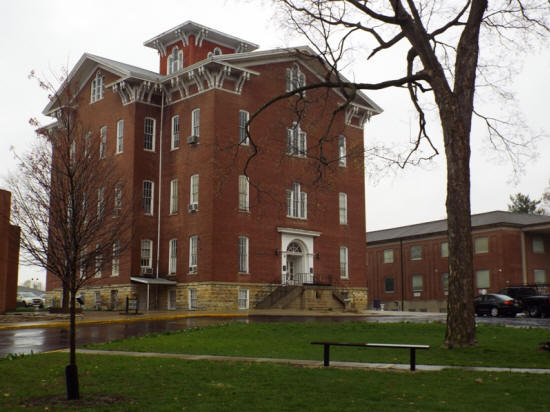|
 The dissertation was for all practical purposes a
blue print of how to go about transitioning a two-year college to a
four-year college, and also offered the reasoning behind why that
should be a goal for our future right here. The dissertation was for all practical purposes a
blue print of how to go about transitioning a two-year college to a
four-year college, and also offered the reasoning behind why that
should be a goal for our future right here.
Dr. Gerlach believes it was that dissertation, and his proposal to
the Lincoln College Trustees that they pursue this plan for LC,
which led to his being hired.
Looking back to see the future
President Gerlach reviewed the history of the college, noting that
when it opened in the mid 1800’s it was a four-year university. It
was also a faith-based school founded by the Presbyterian Churches
located in the southern United States. This was the Civil War Era,
and the church saw a need to establish a college in the ‘northern’
region. They chose Lincoln, Illinois, and the university was named
for then sitting President Abraham Lincoln.
The university continued on until the depression in the early
1900’s. With the depression, LC University Trustees determined that
the college could not afford to continue on as a four-year
institution. The last master’s degree was awarded in 1915. In 1929,
Lincoln University delivered its final bachelor degrees, and in
1930, officially became a two-year college.

From 1930 to the early 2000’s, Lincoln College’s campus (the
trustees changed the name but did not drop the schools ‘University”
designation) continued on as a two-year school. The Normal campus
was then opened and offered a one-year certificate, a two-year
associate and a limited number of bachelor degrees.
Dr. Gerlach said when he came to the trustees in 2015 he saw the
Lincoln campus as “the oddest campus.” He noted that the trustees
touted Lincoln College as the only two-year college with dorms, but
at the same time, it was the most expensive two-year college in the
state.
Dr. Gerlach said he presented his case to the trustees that it was
time to take the Lincoln campus back to its roots as a four-year
institution. The trustees were on board and excited to have this
return to the past for their college.
Dr. Gerlach said since that day, the college has added a number of
baccalaureate or bachelor degrees – 12 to date and more planned for
the future.
He said the end result was that enrollment shot up substantially and
now the college can tout that it is the least expensive four-year
college.
Building a “pragmatic” program
The college is adding baccalaureate or bachelor degrees on a regular
basis. There is a process the school has to go through to get
accreditation to offer each bachelor, so what is coming in the
future are still goals to be achieved, but Dr. Gerlach is optimistic
that the school will add another bachelor's degree and its first
master's in the coming year or two.
The school is looking to add a Bachelor of Law that will be the
preparatory program for those who wish to become attorneys. Dr.
Gerlach said the pre-law curriculum will be modeled after law
schools and will be everything that is needed for a student to
successfully transfer into a law school. The program will also offer
a preparatory for the LSAT (Law School Admission Test) that every
student must pass to be enrolled in a law school.
The first master's to return to Lincoln College will be a Master of
Business Administration (MBA.) Dr. Gerlach said he is hopeful that
these two new degrees will be added for fall 2019.

A third goal is to add a second master’s in 2020 in criminal
justice.
Dr. Gerlach noted that the college is being selective on the
bachelor and master degrees it will offer. He said that the goal is
to offer “pragmatic” or practical degrees that will lead to solid
careers. The school is also looking at the degrees that are needed
in the immediate geographical location. He said that it is important
that the school provide job-worthy graduates who can fill positions
locally. When that happens, the school is adding to the economic
development and growth of the community.
Attracting students from near and far
Dr. Gerlach said that the changes the college is making is
attracting students both from here at home and also from other parts
of the state, country, and even world. The goal is to continue
working to attract local students, but at the same time to expand
the school's reach and bring in more students from out of the area.
Local students, Dr. Gerlach said, are coming to Lincoln College for
a few reasons. They want to play sports at LC, they want to stay
close to home, and they enjoy the smaller campus. Currently,
approximately 50 percent of the enrollment is students from the
immediate area.
Of the other 50 percent, the majority are coming to Lincoln from the
Chicago area. Dr. Gerlach said there is one big reason, these are
students who want to get out of Chicago.
The long-term goal is to increase the enrollment at LC from the 750
or so students today, to 2,000 by the year 2031. Dr. Gerlach said
that is an attainable goal, but to get there, the college is going
to have to attract students from out of state and even out of this
country. To that end, LC Vice President Dr. Hamin Shabazz has made
one trip to China and India and was recently selected for a
Fulbright International Education Administrators Seminar Award to
India next spring.
President Gerlach said that the school must grow and with the
governmental situations in Illinois, the population of the state on
the whole is shrinking. The school will have to grow its student
population from other sources. Again, the goal includes bringing
young people into the community who may choose to stay when their
educational career is completed.
Growing the college without growing the campus

Can the current LC campus accommodate the growth in
numbers and types of degrees, as well as the goal to have an
enrollment of 2,000 students?
Dr. Gerlach said that right now it can. He noted that at University
Hall, there are 15 classrooms in the upper levels of the building
that are not being utilized. One of the first goals is to prepare
those classrooms for students.
In 2016, LC Alum Pat Carroll donated $1 Million to the college in
honor of former LC President Jack Nutt. The money was earmarked then
for improvements to University Hall. That money, Dr. Gerlach said
will be utilized to renovate those 15 classrooms. He said he also
envisions an annex to be added to the back side of the building that
will provide elevators to the upper floors.
Dr. Gerlach said another move that will grow the school is to expand
the classroom hours. He noted that currently classes are being
scheduled in the middle part of the day. As the list of classes and
number of students increase, the normal class day can be expanded on
both ends with classes starting earlier in the day and finishing
later in the day. So, for the time being, Dr. Gerlach said the
school has plenty of room to grow its offerings and its population
without growing the campus.
Expanding student housing
With growing the student population, student housing is going to be
in big demand. Dr. Gerlach noted that the school purchased and
renovated the apartment complex across the road from the Lincoln
Center with great success. He said that the school purchased
multiple units and spent a sizeable about of money to bring them up
to snuff for students. The end result he said is that the
renovations improved the curb appeal of the area and also offered
some wonderful housing for students close to campus.
The next goal of the college is to complete the renovations at the
former St. Clara’s Manor on Fifth Street in Lincoln. Gerlach said
work is underway and when completed, the building will offer a
nicely remodeled building with community space and 140 beds for
students.
He also noted that within that building, there are several rooms
that will not be dormitory space. Those rooms he said could be
converted for use in education. Dr. Gerlach
said another positive note he’s seeing in the community that will
need to continue is the offering of rental properties by private
owners for students. He noted that there is currently a large home
on Union Street that has been opened exclusively to LC students. He
said more of that will be needed in the future.
Gerlach noted again, that is the college having a
positive economic impact on the community.
[to top of second column] |

Community involvement
At Lincoln College a part of the educational process is to teach and
encourage good neighbor attitudes with the students.
The college’s “Champions of Character” projects are designed to help
students engage in the community through community service. Dr.
Gerlach said that the college works to assist students to understand
the need to make a positive impact on the community.
He said this is working well as students are volunteering to be a
part of community events and assist local organizations. He noted
that students are volunteering to work at local festivals, are
contributing to the Third Friday events in Lincoln and are
volunteering at local not-for-profits such as the Humane Society of
Logan County. They also volunteer at the local food pantry and spend
time at St. Clara’s Manor.
He said that the students in the music programs are doing
performances downtown in a variety of the local businesses.
Being out in the community gives the students a sense of home and at
the same time gives the general public the opportunity to see and
get to know the students.
Economic impact
President Gerlach said that an important component of growing
Lincoln College is the economic impact it will have in Lincoln and
Logan County.
He noted that currently the college adds $43,000,000 per year into
the main stream of cash flow in the community through jobs, housing
opportunities, food, and much more.
The 700-plus students do shop locally. They visit Lincoln stores
buying food, clothing, and daily needs items. They visit the
restaurants and coffee shops, they go to movies at the local
theater, and much more.
In addition, the school employs 350 people full time and offers some
part time positions.

He said that LC had added the bus service for students, and he was
happy to see the bus making the rounds in the downtown area because
it means that students were out in the community, shopping and
spending money locally.
President Gerlach noted that when the Lincoln Developmental Center
closed in 2002 that it had a devastating impact on the local
economy. He said that Lincoln College is replacing that loss and has
the potential to become the largest employer in the county in the
future.
What is needed?
For Lincoln College to continue on its mission of growth a key
component of success is going to be community support. President
Gerlach noted that the school has a long history of being
well-supported by the community and he wants that to continue on.
He noted for example that in 1919 the school was in financial
trouble. It was the community that stepped up to the plate and in a
fundraising effort the school brought in $200,000 from community
members. That was an enormous amount of money in 1919. To help put
that into perspective the $200,000 raised in 1919 would be equal to
raising about $3 M today.
As a private college, the school receives no state dollars. While
students are eligible for student loans and grants, the school
itself receives no support. Therefore, continued gifts such as that
made by Pat Carroll, Waldo and Rosalee Bertoni ($500,000 gifted to
the Lincoln Heritage Museum) and others will be necessary.
Dr. Gerlach said that in the future, there will be a need for
internships with local businesses. The college needs the support of
the business community in providing those opportunities for
students. While those internships are temporary, they could also
lead to future employment for a student, again answering the goal to
keep students in the community after graduation.
And, the college needs the moral support of the community. Gerlach
said that the college is working to put a positive light on the
school and its students, and he hopes the community will be
supportive and positive about the growth plan for the school.

He said that there will always be some “nastiness” but that he hopes
the students will display a positive attitude out in the community
and that Lincoln and Logan County residents will return the same. He
said when kids do misbehave they are dealt with swiftly. He added
that the majority of the students at LC are good people with good
intentions and he wants the community to see that.
To future students
Lincoln College has a lot to offer for students who want a practical
education that will lead to a solid career. The school offers a
great athletics program and is performing very well on the four-year
college level. Now a member of the National Association of
Intercollegiate Athletes (NAIA), LC athletes are competing with
four-year colleges and are making a good name for themselves. Dr.
Gerlach noted that the NAIA is the collegiate athletic program for
smaller colleges, but that as a member, LC is going up against some
top rate university teams. Recently the Lynx Men’s Basketball Team
played against and beat the number six team in the nation, a huge
accomplishment.
For students looking for more bang for the buck, Lincoln College is
the lowest priced four-year college in the state. The average annual
tuition at LC is $17,000 compared to $40,000 at a state college or
university.
This year the school also introduced it’s “price match” program. Dr.
Gerlach is very proud of this offering saying that no matter what
another school offers a student, LC can match it. Not only that, but
the college may beat the price by up to $2,000.
The program was announced on December 6, 2018 with a press release
published in Lincoln Daily News. In that release President Gerlach
said, “At Lincoln College, we have long
offered scholarships or grants to all full-time traditional
students. With the new ‘Lincoln College Price Match Program’ we are
expanding our options to make financing a college education easier."
“It’s really quite simple,” Gerlach said. “If you receive a better
financial aid package from another qualifying college or university,
provide us with a copy of your competing financial aid award letter.
If you meet all eligibility requirements, Lincoln College attempts
to not only match the net price of your competing offer but may
include an additional $2,000 award ($1,000 per semester) in your
Lincoln College financial aid package.”
So, the future looks bright
The Lincoln College president is excited about and devoted to seeing
the growth that he outlined to the LC Board of Trustees at his job
interview in 2015, just a few short years ago and yet so much has
changed already.
The board of trustees too are excited about the future of the
school.
And, with opportunities to talk about the school and what is going
on, Dr. Gerlach is hopeful that the community will also be excited
and will continue to support the college as it grows.
|
Read all the articles in our
new
2019 Education Magazine
Title
CLICK ON TITLES TO GO TO PAGES |
Page |
|
Lessons
for all - How to be good people |
4 |
| LJHS
new Eaton STEM Lab sparks learning |
9 |
|
Hands-n learning in LJHS STEM lab |
11 |
|
Cheerleading encourages discipline and high
academic standards |
16 |
|
Outstanding educators produce students who
succeed at life |
19 |
|
Current status report for West Lincoln Broadwell
School |
23 |
|
Tutoring can minimize anxiety and result in
stronger grades |
24 |
| ACT or
SAT: What is a college bound high school
student to do? |
28 |
| Logan
County Education Coalition assists in finding
post secondary education opportunities and funds |
31 |
|
Lincoln Colleges moves forward by looking to its
past |
35 |
|
|